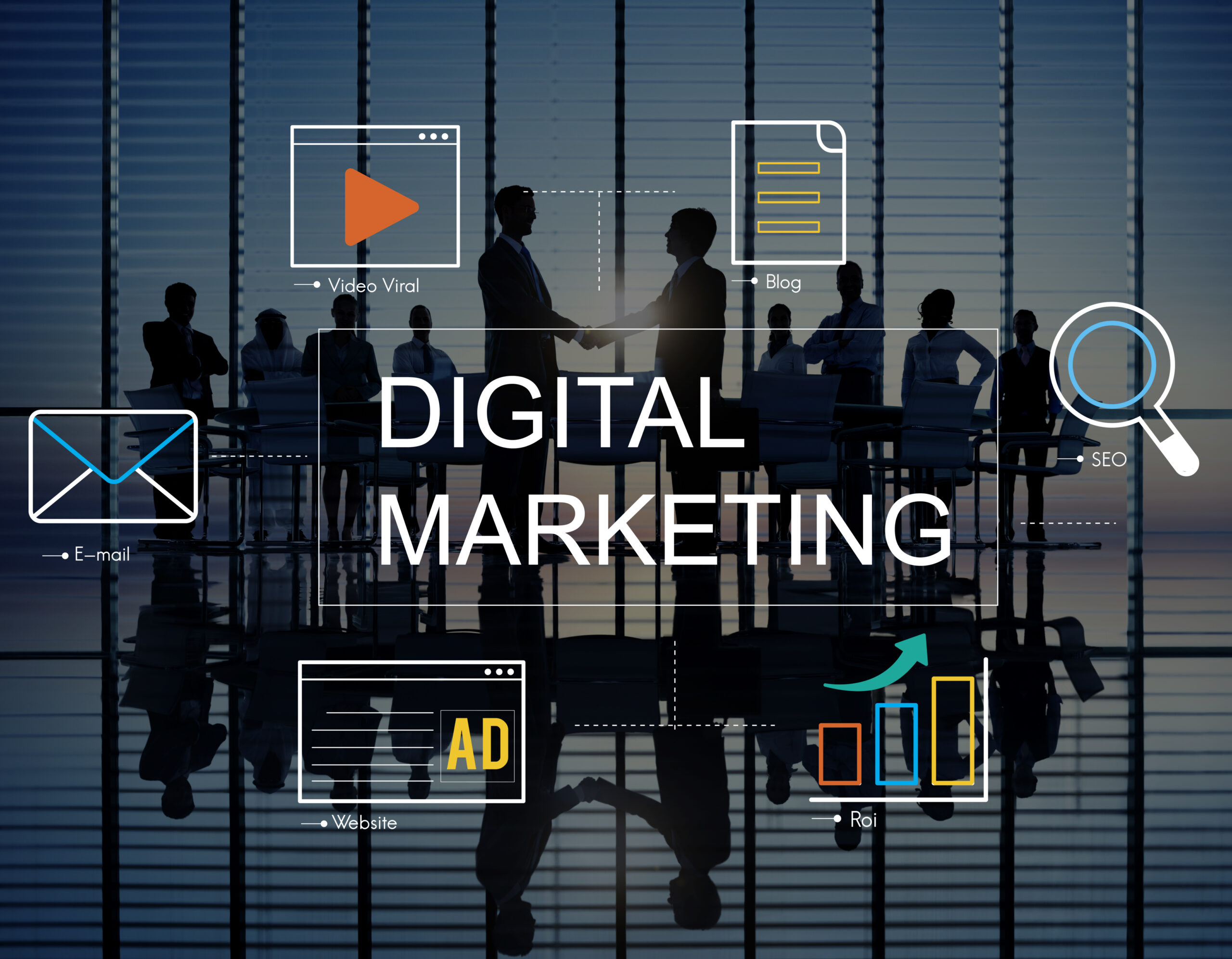Understanding the Digital Marketing Landscape
Digital marketing has become an integral part of the business world, shaping the way brands connect with their target audience. In today’s technologically driven era, businesses need to adapt and understand the ever-changing digital marketing landscape to stay competitive. Let’s explore the current digital marketing trends, the importance of digital marketing in 2024, and the key challenges associated with it.
Overview of the Current Digital Marketing Trends

The digital marketing landscape is constantly evolving, driven by advancements in technology and shifts in consumer behavior. In recent years, we have witnessed the rise of social media marketing, influencer collaborations, video content, and personalized advertising. Mobile marketing, voice search optimization, and data-driven decision making have also gained significant momentum.
Importance of Digital Marketing in 2024
As we move towards 2024, the significance of digital marketing continues to grow exponentially. With more people relying on digital platforms for information, entertainment, and commerce, businesses need to establish a strong online presence to reach their target audience effectively. Digital marketing provides an opportunity to build brand awareness, drive customer engagement, and increase sales in a cost-effective manner.
Key Challenges in the Digital Marketing Landscape
While digital marketing offers immense opportunities, it also presents a set of challenges that businesses must navigate. One of the primary challenges is keeping up with the rapid pace of technological advancements. Marketers need to stay updated with the latest trends, algorithms, and tools to ensure their strategies remain effective.
Additionally, the increasing competition for online visibility, dealing with data privacy concerns, and managing online reputation are other key challenges faced by marketers.
Developing a Comprehensive Digital Marketing Strategy
To succeed in the digital marketing landscape, businesses must develop a comprehensive strategy that aligns with their goals and target audience. Let’s discuss some essential components of a robust digital marketing strategy.
Defining Clear and Achievable Marketing Objectives
Setting clear and achievable marketing objectives is fundamental to any successful digital marketing strategy. Whether it’s increasing website traffic, driving lead generation, or improving brand recognition, clearly defined objectives provide a roadmap for measuring success and guiding decision-making processes.
The Significance of Data-Driven Decision Making
Data-driven decision making has become a cornerstone of effective digital marketing strategies. By leveraging analytics tools, businesses can gather valuable insights into consumer behavior, preferences, and trends. These insights enable marketers to optimize their campaigns, improve targeting, and personalize their messaging for maximum impact.
Identifying Target Audience and Creating Buyer Personas
Understanding the target audience is crucial for crafting tailored marketing messages and delivering them through the appropriate channels. Marketers should invest time in researching their target demographic, their online behaviors, and their preferred platforms. This knowledge allows for the creation of buyer personas, detailed representations of their ideal customers, helping to focus marketing efforts and enhance engagement.
Leveraging Social Media Platforms for Marketing Success
Social media has revolutionized the way businesses communicate with their customers. With billions of active users, it has become an indispensable tool for digital marketing. Let’s explore some effective strategies for leveraging social media platforms for marketing success.
Utilizing Emerging Social Media Trends
The social media landscape is continually evolving, introducing new features and trends. To stay ahead, marketers should stay informed about the latest developments and adapt their strategies accordingly. From utilizing ephemeral content like Instagram Stories to leveraging live videos and interactive polls, embracing emerging trends allows businesses to captivate and engage their audience effectively.
Engaging with Audiences through Interactive Content
Interactive content has gained immense popularity in recent years. By incorporating elements such as quizzes, contests, and surveys into their social media campaigns, businesses can encourage active participation from their audience. This engagement not only raises brand awareness but also fosters a sense of community, loyalty, and dialogue, leading to increased customer satisfaction and stronger brand advocacy.
Strategies for Effective Influencer Marketing Partnerships
Influencer marketing has emerged as a powerful tool for brands to connect with their target audience authentically. By collaborating with influencers whose values align with their brand, businesses can leverage the influencers’ existing credibility and reach. Successful influencer marketing campaigns can generate brand awareness, boost conversions, and create a positive brand image.
Implementing Advanced SEO and Content Marketing Techniques
Search Engine Optimization (SEO) and content marketing play a vital role in improving a brand’s online visibility and driving organic traffic. Let’s delve into some advanced techniques in these areas.
Understanding the Latest SEO Algorithms
Search engines continuously update their algorithms to provide relevant and high-quality search results to users. Marketers must stay updated with these algorithm changes to optimize their websites and content for better search engine rankings. By utilizing techniques such as keyword research, on-page optimization, and quality backlink building, businesses can improve their organic search visibility and attract targeted traffic.
Creating High-Quality and Engaging Content
Content marketing remains a cornerstone of digital marketing strategies.
However, in today’s saturated digital landscape, creating high-quality and engaging content is essential to stand out from the competition. By focusing on creating valuable, informative, and shareable content, businesses can establish themselves as industry thought leaders and build trust and credibility with their audience.
Leveraging Video and Visual Content for Improved Engagement
Visual and video content has witnessed tremendous growth as consumers increasingly prefer consuming information in easily digestible formats. Incorporating videos, infographics, and visually appealing images into digital marketing campaigns can enhance engagement levels and increase content reach.
Moreover, leveraging platforms like YouTube, TikTok, and Instagram Reels can help businesses tap into the vast video-sharing audience.
Harnessing the Power of Data Analytics for Marketing Insights
Data analytics provides a wealth of information that can drive informed decision making and optimize digital marketing strategies. Let’s explore how businesses can harness the power of data analytics for valuable marketing insights.
Utilizing Advanced Analytics Tools for Tracking and Measuring Performance
With the availability of advanced analytics tools, marketers can track and measure the performance of their digital marketing efforts accurately. These tools provide valuable metrics such as website traffic, conversion rates, customer behavior, and engagement levels. By monitoring these metrics, marketers can identify areas of improvement, track campaign success, and make data-driven optimizations.
Interpreting Data to Optimize Marketing Strategies
Collecting data is only valuable if it can be properly interpreted and applied. Marketers should analyze the collected data to gain insights into consumer preferences, interests, and behaviors. This analysis allows them to refine their targeting, optimize marketing messages, and deliver personalized experiences that resonate with their audience.
Utilizing Predictive Analytics for Future Marketing Initiatives
Predictive analytics utilizes historical data to make predictions about future outcomes and trends. Marketers can leverage this technology to identify patterns, forecast consumer behavior, and tailor their marketing initiatives accordingly. By anticipating customer needs and preferences, businesses can stay ahead of the competition and deliver relevant and personalized experiences that drive customer loyalty.
Embracing Emerging Technologies in Digital Marketing
As technology continues to advance, businesses need to embrace emerging trends and technologies to stay relevant in the digital marketing landscape. Let’s explore some of the key emerging technologies that are shaping the industry.
Exploring the Potential of AI and Machine Learning in Marketing
Artificial Intelligence (AI) and Machine Learning (ML) have the potential to revolutionize digital marketing. From chatbots providing instant customer support to AI-powered recommendation engines, these technologies can enhance customer experiences, automate processes, and deliver personalized content at scale. Marketers should explore how AI and ML can be integrated into their strategies to improve efficiency and achieve better results.
Implementing Augmented Reality and Virtual Reality in Marketing Campaigns
Augmented Reality (AR) and Virtual Reality (VR) technologies offer immersive and interactive experiences for customers. Marketers can leverage AR and VR to provide virtual product demonstrations, offer unique brand experiences, and engage with customers in exciting ways. By implementing these technologies strategically, businesses can differentiate themselves and create memorable experiences that leave a lasting impression.
Understanding the Impact of Voice Search and Smart Devices on Marketing Strategies
The rise of voice assistants and smart devices has transformed the way people search for information and interact with technology. Marketers must adapt their strategies to optimize for voice search and cater to the growing user base of smart devices. This includes focusing on long-tail keywords, creating conversational content, and ensuring their websites are mobile-friendly and voice search compatible.
Read Also: How To Choose The Right Digital Marketing Course For Career Growth
FAQs
What is Digital Marketing in 2024?
Digital marketing in 2024 encompasses the strategies and techniques used by businesses to promote their products or services through various digital channels. It includes activities such as search engine optimization, social media marketing, content creation, and data analytics. In 2024, digital marketing will play an even more central role in connecting businesses with their target audience and driving meaningful engagement.
How is Digital Marketing Evolving in 2024?
Digital marketing is constantly evolving as technology and consumer behavior change. In 2024, we can expect further advancements in artificial intelligence, personalization, and immersive experiences. Marketers will need to adapt to emerging technologies, leverage data-driven insights, and keep up with the ever-changing digital landscape to remain competitive.
What are the Key Strategies for Digital Marketing in 2024?
Key strategies for digital marketing in 2024 include data-driven decision making, leveraging emerging technologies, focusing on personalized experiences, and creating high-quality and engaging content. Marketers will need to prioritize customer-centric approaches, optimize for mobile and voice search, and embrace automation and AI-powered tools to drive effective results.
Why is Digital Marketing Important for Beginners in 2024?
Digital marketing provides a level playing field for businesses of all sizes. For beginners, it offers cost-effective ways to reach a wide audience and build brand awareness. With the right strategies and execution, digital marketing can help beginners establish their online presence, connect with their target audience, and drive business growth in 2024 and beyond.
In conclusion, understanding the digital marketing landscape is crucial for businesses in 2024. Developing a comprehensive strategy that leverages social media platforms, embraces emerging technologies, and harnesses the power of data analytics is essential for marketing success. By staying informed about the latest trends and challenges, businesses can navigate the dynamic digital marketing landscape and achieve their objectives effectively.





